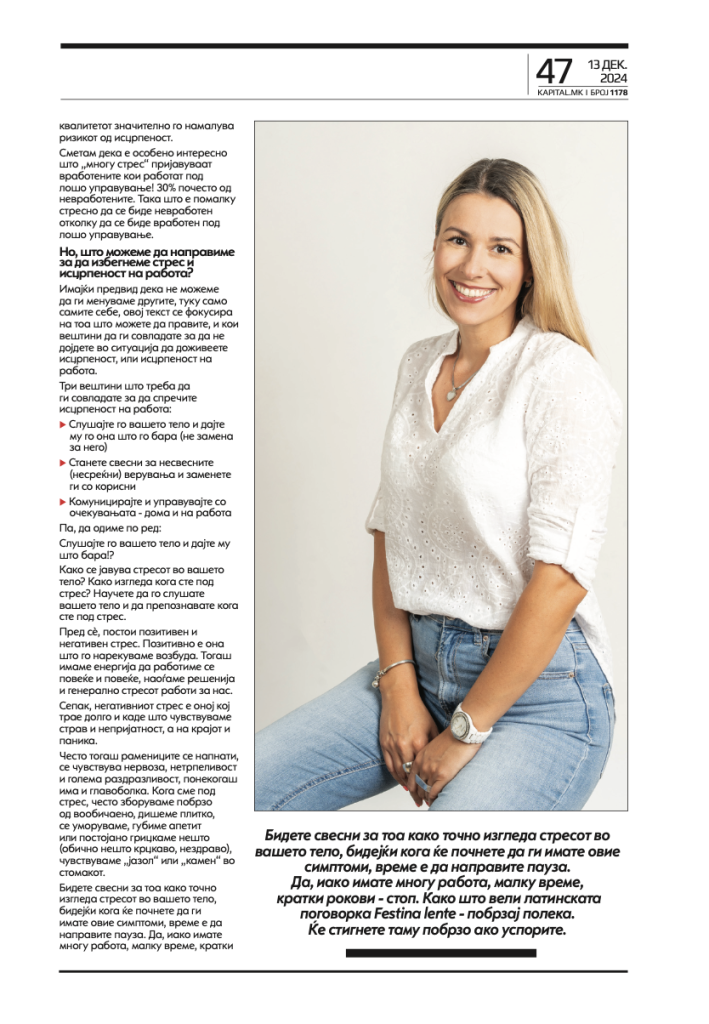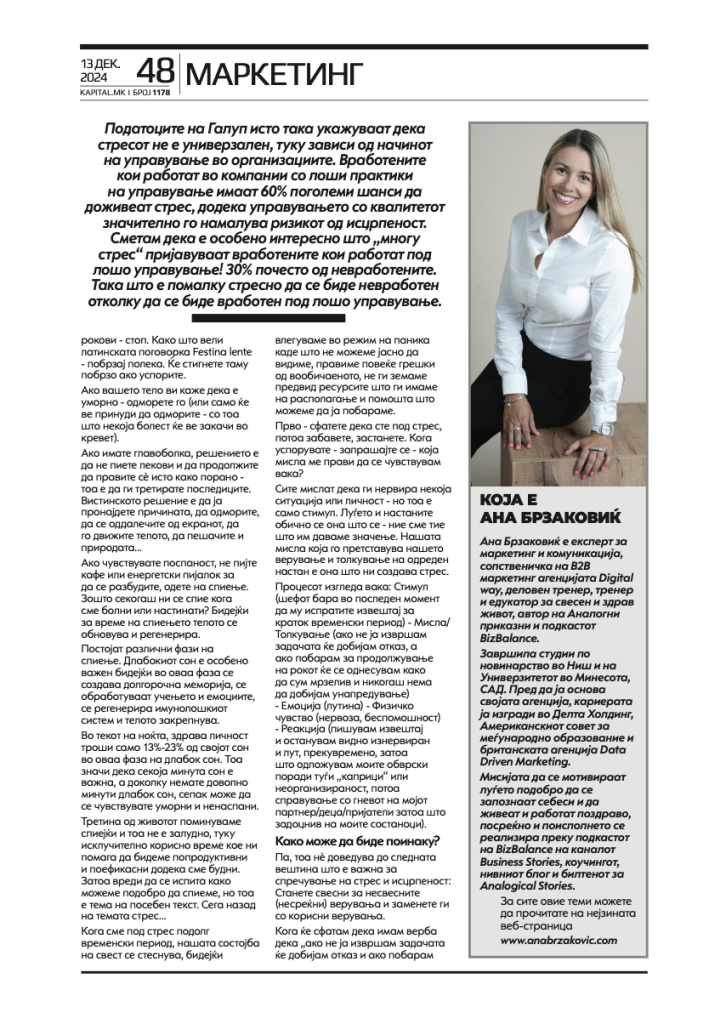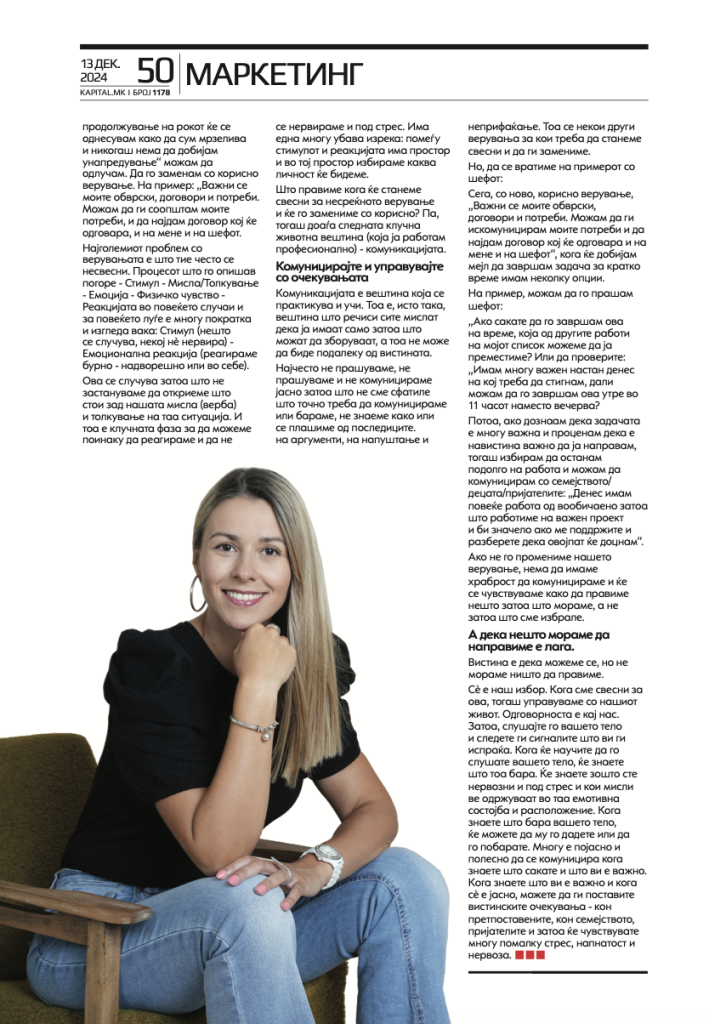Three Skills You Need to Master to Prevent Burnout
People’s mental health is in serious decline. According to the 2023/2024 United Nations Development Programme report, the number of people experiencing stress, sadness, anxiety, anger, or worry has been steadily increasing, reaching its highest levels since Gallup began researching this problem.
Professor Christine Porath from Georgetown University highlights that increasing stress is leading to a rise in uncivil behavior at work. This is particularly alarming when we consider that we spend a significant amount of time working.
Gallup’s data also shows that stress is not universal; it depends on how organizations are managed. Employees in companies with poor management practices are 60% more likely to experience stress, whereas good leadership significantly reduces the risk of burnout.
A particularly striking statistic is that employees under poor leadership report “a lot of stress” 30% more often than unemployed individuals. In other words, it is less stressful to be unemployed than to work under bad management.
So, what can we do to avoid stress and workplace burnout?
Since we cannot change others but only ourselves, this article focuses on what you can do and which skills you need to master to avoid burnout at work.
Three Skills You Need to Master to Prevent Burnout:
- 1. Listen to your body and give it what it needs.
- 2. Recognize unconscious (unuseful) beliefs and replace them with useful ones.
- 3. Communicate and manage expectations—both at home and at work
Let’s go through them step by step:
1. Listen to Your Body and Give It What It Needs
How does stress manifest in your body? What does it feel like when you’re under stress? Learn to listen to your body and recognize when stress is setting in.
First, it’s important to note that there is both positive and negative stress. Positive stress, also known as excitement, gives us the energy to work harder, find solutions, and generally helps us perform better.
However, negative stress is prolonged and brings fear and discomfort, which can eventually lead to panic.
Common signs of stress include tense shoulders, nervousness, impatience, irritability, headaches, faster speech, shallow breathing, fatigue, loss of appetite, or constant snacking (usually unhealthy, crunchy foods). You might feel a “knot” in your stomach.
Recognizing these symptoms is crucial. The moment you notice them, it’s time to take a break. Even if you have a heavy workload and tight deadlines—pause. As the Latin saying goes, Festina lente—make haste slowly. You’ll get there faster if you slow down.
If your body is telling you it’s tired—rest. Otherwise, your body will force you to rest by making you sick and confining you to bed.
If you have a headache, the solution isn’t to take a pill and keep working—that’s treating the symptom, not the cause. The real solution is to identify the root problem: take a break, step away from the screen, move your body, go for a walk, and spend time in nature.
If you’re sleepy, don’t rely on coffee or energy drinks—sleep. When we’re sick, we tend to sleep more because sleep is when the body repairs and regenerates itself.
There are different stages of sleep, but deep sleep is particularly important. During this phase, the brain consolidates long-term memory, processes emotions, regenerates the immune system, and heals the body.
A healthy person spends only 13-23% of their sleep in deep sleep each night. If you don’t get enough sleep, you may still feel tired even after a full night’s rest.
We spend one-third of our lives sleeping, and that’s not wasted time—it’s essential for productivity and efficiency when we’re awake. That’s why improving sleep quality is worthwhile, but that’s a topic for another article.
Now, back to stress…
When we experience prolonged stress, our awareness narrows. We enter a state of panic where we struggle to see solutions, make more mistakes, overlook available resources, and fail to seek help.
First, recognize that you’re under stress. Then, slow down and pause. Once you pause, ask yourself: What thought is causing me to feel this way?
Most people believe that an external situation or person is what stresses them out. But that’s just a stimulus. Events and people are what they are—it’s our interpretation of them that creates stress.
The process works like this:
Stimulus (e.g., your boss asks for a last-minute report on a tight deadline)
Thought/Interpretation (e.g., “If I don’t complete this task, I’ll get fired. If I ask for an extension, I’ll seem lazy and never get promoted.”)
Emotion (e.g., anger, frustration)
Physical reaction (e.g., nervousness, tension, irritability)
Behavior (e.g., working overtime, feeling resentful, neglecting personal time and relationships)
How can this be different?
That brings us to the next crucial skill for preventing stress and burnout:
2. Recognize Unconscious (Unuseful) Beliefs and Replace Them with Useful Ones
If I recognize my belief that “If I don’t complete this task, I’ll get fired” and replace it with something more constructive, I gain control over my reaction.
For example, I could replace that belief with: “My priorities and needs are important. I can communicate with them and find a solution that works for both me and my boss.”
The biggest problem with beliefs is that they are often unconscious.
Most people experience:
Stimulus (someone upsets them) → Emotional reaction (yelling in frustration).
They skip the thought process, which is the key step in changing how we respond to stress.
As Stephen Covey explains, “Between stimulus and response, there is a space, and in that space, we choose what kind of person we want to be.”
Once you become aware of an unhelpful belief and replace it with a useful one, the next step is effective communication—a skill that is critical for managing stress and expectations.
3. Communicate and Manage Expectations
Communication is a skill that must be practiced and learned. Many assume they are good communicators simply because they can talk, but that’s far from the truth.
Most of us don’t ask, don’t clarify, and don’t communicate effectively because:
We’re unaware of what exactly we need to communicate.
We don’t know how to express it.
We fear conflict, rejection, or negative consequences.
Going back to the example with the boss:
Now that I’ve adopted a more constructive belief—“My needs matter. I can negotiate and find a solution that works for everyone”—I have several options.
For instance, I can ask:
“If you need this done by the deadline, which of my other tasks can be postponed?”
“I have an important commitment today. Can I complete this by tomorrow at 11 AM instead of tonight?”
If I learn that the task is truly urgent, I may choose to stay late—but this time, it’s a choice, not a sacrifice. And I can communicate with my family:
“I have an important project, and I’d appreciate your support in understanding that I’ll be late tonight.”
When we don’t change our beliefs, we lack the confidence to communicate. We feel forced rather than in control.
But the truth is, nothing is mandatory—everything is a choice.
When we understand this, we regain control of our lives.
When we understand this, we regain control of our lives.
When we understand this, we regain control of our lives.
Final Thoughts
Listen to your body’s signals.
Identify the thoughts that cause stress and replace them.
Communicate clearly and set the right expectations.
By mastering these three skills, you’ll experience far less stress, tension, and frustration—both at work and at home.
This article was published in the Macedonian weekly Kapital, Bosnian Brand Magazine, and on the Serbian Blic biznis online portal.






